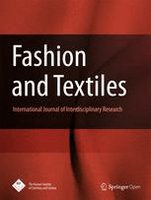
Fashion and Textiles
Scope & Guideline
Navigating the Fabric of Fashion Research
Introduction
Aims and Scopes
- Innovative Textile Technologies:
The journal publishes research on the latest advancements in textile technologies, including smart textiles, 3D printing, and sustainable materials, highlighting the role of innovation in textile engineering. - Fashion Design and Consumer Behavior:
Research exploring the dynamics of fashion design, consumer preferences, and the impact of social media on fashion trends is a core area, emphasizing consumer engagement and marketing strategies. - Sustainability in Fashion:
A significant focus is placed on sustainable practices within the fashion industry, including eco-friendly materials, recycling methods, and corporate social responsibility, reflecting the industry's shift towards sustainability. - Ergonomics and Functional Design:
The journal addresses the ergonomic aspects of clothing and textiles, including comfort, fit, and functionality, particularly in specialized applications such as sportswear and medical devices. - Digital Fashion and Virtual Environments:
Research on digital fashion, including virtual fitting technologies, augmented reality applications, and the use of artificial intelligence in fashion design, is increasingly prevalent.
Trending and Emerging
- Smart Wearable Technologies:
There is a growing interest in the development and application of smart textiles and wearable technologies, focusing on functionality and user interaction, which aligns with advancements in IoT and health monitoring. - Sustainability and Circular Fashion:
Sustainability continues to be a prominent theme, with increasing research on circular fashion practices, waste reduction, and environmentally friendly materials, reflecting a global shift towards sustainable fashion. - Digital Fashion and Virtual Experiences:
The rise of digital platforms for fashion, including virtual fitting technologies and augmented reality, is a trending theme, addressing the changing landscape of fashion consumption and design. - Consumer Engagement through Technology:
Research on how technology, including AI and data analytics, influences consumer behavior and engagement in fashion is on the rise, highlighting the importance of personalized experiences. - Health and Safety in Fashion Textiles:
Emerging studies focus on health-related applications of textiles, such as antimicrobial fabrics, ergonomic designs, and protective clothing, especially in light of global health challenges.
Declining or Waning
- Traditional Textile Techniques:
Research focusing on traditional textile techniques and craftsmanship has seen a decline, as the journal increasingly emphasizes modern technologies and innovations. - Physical Retail Dynamics:
With the rise of online shopping and digital experiences, studies centered around traditional brick-and-mortar retail dynamics are becoming less common, reflecting a shift in consumer behavior. - Conventional Fashion Marketing Strategies:
The exploration of traditional fashion marketing strategies is waning, as the focus shifts towards digital marketing, influencer dynamics, and personalized consumer experiences. - Historical Fashion Studies:
Research that delves deeply into historical fashion trends and their socio-cultural implications is becoming less frequent, as contemporary issues and technological advancements take precedence. - Basic Fabric Properties Analysis:
While fabric properties are still relevant, there is a noticeable decrease in studies that solely focus on basic analysis without integrating innovative applications or technologies.
Similar Journals

npj Flexible Electronics
Unveiling the Potential of Flexible Electronicsnpj Flexible Electronics, published by NATURE PORTFOLIO, is a premier open-access journal dedicated to the rapidly advancing field of flexible electronics. Since its inception in 2017, the journal has gained significant recognition, boasting impressive rankings as a Q1 journal in both Electrical and Electronic Engineering and Materials Science based on the 2023 metrics. With its E-ISSN 2397-4621, the journal serves as an essential platform for researchers, professionals, and students alike, facilitating the dissemination of high-quality research articles, reviews, and insights that drive innovation across multidisciplinary applications. Operating from its base in Berlin, Germany, and characterized by a robust impact within the academic community, npj Flexible Electronics plays a critical role in shaping the future of electronic materials and devices. The journal offers comprehensive open access options, ensuring that cutting-edge research is readily available and widely disseminated, fostering collaboration and engagement within the global research community.
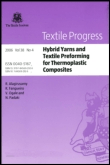
TEXTILE PROGRESS
Empowering Progress in Textile Engineering and ManufacturingTEXTILE PROGRESS is a premier academic journal published by Taylor & Francis Ltd, dedicated to advancing the field of textiles and materials science. With an ISSN of 0040-5167 and an E-ISSN of 1754-2278, this journal serves as a vital resource for researchers and professionals interested in the interplay between chemical engineering, industrial processes, and manufacturing technologies related to textiles. Covering a wide scope of topics from 1969 to 2024, TEXTILE PROGRESS has established its reputation within the scholarly community, consistently achieving a Q2 ranking in various categories including Chemical Engineering, Industrial and Manufacturing Engineering, and Materials Science as of 2023. Its impressive Scopus rankings – 121st in Industrial and Manufacturing Engineering and 101st in General Chemical Engineering – reflect its significance and relevancy in the academic landscape. While not an open-access journal, TEXTILE PROGRESS ensures accessibility through its extensive distribution channels, enabling students, researchers, and professionals alike to benefit from cutting-edge research and developments in textile technology and science.

Tekstil ve Konfeksiyon
Fostering Interdisciplinary Insights in Textile and FashionTekstil ve Konfeksiyon, a distinguished journal published by the E.U. Printing and Publishing House, serves as a vital resource in the fields of Industrial and Manufacturing Engineering as well as Materials Science. With an ISSN of 1300-3356, this Turkish journal has witnessed significant development since its inception in 2008, continuing to contribute valuable insights and advancements through 2024. Although categorized in the third quartile (Q3) for Industrial and Manufacturing Engineering and the fourth quartile (Q4) for Materials Science, the journal ranks respectably within its fields—249th out of 384 and 357th out of 463, respectively, according to Scopus. Researchers, professionals, and students can gain access to a variety of cutting-edge studies and applications that reflect the latest trends and innovations in textile and apparel technology. The journal emphasizes the importance of practical applications and interdisciplinary research, fostering a platform for knowledge exchange and development aimed at pushing the boundaries of textile and clothing sciences.

Journal of Fiber Science and Technology
Innovating Textiles for Tomorrow's ChallengesJournal of Fiber Science and Technology is a pivotal scholarly publication dedicated to advancing the field of fiber science, encompassing the study of fibers and textiles across various applications. Published by SOC FIBER SCIENCE TECHNOLOGY in Japan, this journal has been a significant forum for innovative research since its inception, with coverage from as early as 1946. Despite its current categorization in the Q4 quartile across multiple disciplines including Chemical Engineering, Industrial and Manufacturing Engineering, and Materials Science, the journal provides a valuable platform for the dissemination of knowledge, fostering collaboration among researchers, professionals, and students alike. The journal promotes an interactive learning environment, welcoming contributions that underscore the latest advancements in fiber materials, processing technologies, and their broad industrial implications. By bridging theory and practical application, the Journal of Fiber Science and Technology is essential in shaping the future of fiber technology.
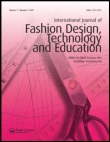
International Journal of Fashion Design Technology and Education
Advancing Knowledge in Fashion for Tomorrow's CreativesThe International Journal of Fashion Design Technology and Education, published by Taylor & Francis Ltd, stands at the forefront of research in the dynamic fields of fashion design, technology, and education. Since its inception in 2008, the journal has provided a vital platform for researchers, educators, and practitioners to share innovative findings, pedagogical strategies, and technological advancements within the fashion industry. With an impressive impact factor and categorizations in the Q1 and Q2 quartiles across multiple disciplines—including Visual Arts, Education, and Industrial Engineering—this journal not only offers insightful contributions to academia but also informs practical applications in the ever-evolving fashion landscape. Although currently non-open access, the journal remains accessible to a wide range of audiences, facilitating a deeper engagement with contemporary issues in fashion technology and education. As the journal converges its themes through to 2024, it continues to encourage submissions that push the boundaries of knowledge and creativity, making it an essential resource for anyone invested in the future of fashion.
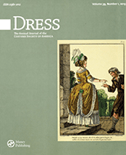
Dress-The Journal of the Costume Society of America
Navigating the Evolving Landscape of Costume StudiesDress - The Journal of the Costume Society of America, published by Routledge Journals, Taylor & Francis Ltd, serves as a premier platform for scholarship in the field of costume and fashion studies. Established in 1975, this journal has evolved significantly, covering a comprehensive spectrum of topics from historical textiles to contemporary fashion impacts. With its Q2 ranking in both Visual Arts and Performing Arts categories as of 2023, it boasts a reputable standing among its peers, positioned at a 38th percentile in Scopus rankings for Arts and Humanities. Although currently not Open Access, the journal aims to foster peer-reviewed research that not only enhances academic discourse but also informs practical applications in the arts and cultural industries. The combination of rigorous scholarship and a dedication to the rich cultural narratives of dress places Dress at the forefront of costume research, making it an invaluable resource for researchers, professionals, and students alike who are passionate about exploring the complex interplay of clothing, identity, and society.
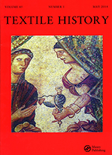
TEXTILE HISTORY
Stitching Together the Past and PresentTEXTILE HISTORY is a distinguished journal focusing on the rich tapestry of textile development across various historical contexts, published by Routledge Journals, Taylor & Francis Ltd. With origins dating back to 1968, this journal serves as a crucial platform for scholarly discourse in the fields of history, industrial and manufacturing engineering, and business management. It holds impressive rankings, including Q2 in History and ranks within the top 20% in Arts and Humanities, reflecting its significant contribution to understanding the socio-economic and cultural implications of textiles. Additionally, it operates under a traditional access model, ensuring that quality research is preserved within a structured environment. The journal is an invaluable resource for researchers, professionals, and students alike, aiming to advance knowledge and inspire future studies in textile history. Situated in the United Kingdom, the editorial team is committed to fostering a vibrant academic community that engages with the dynamic intersections of textiles, industry, and cultural heritage.
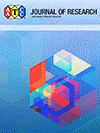
AATCC Journal of Research
Advancing materials science through rigorous research.AATCC Journal of Research is an esteemed publication at the forefront of materials science, focusing on the latest advancements in the fields of materials chemistry, polymers and plastics, and process chemistry and technology. Published by SAGE Publications Inc. in the United States, the journal disseminates high-quality research that shapes the future of textile and materials innovation through rigorous peer-reviewed studies. With a notable impact factor indicative of its scholarly influence, AATCC Journal of Research stands out in the Q3 quartile rankings across its categories for 2023, making it a significant platform for emerging research and technological advancements. The journal's commitment to excellence is reflected in its extensive coverage from 2014 to 2024, and it is an essential resource for researchers, professionals, and students aiming to stay abreast of the latest trends and technologies in the materials science domain. While it operates under a traditional access model, the potential for pioneering knowledge exchange remains paramount, further solidifying its role in the academic and professional communities.

FIBRES & TEXTILES IN EASTERN EUROPE
Unveiling Trends and Innovations in Eastern European TextilesFIBRES & TEXTILES IN EASTERN EUROPE, published by the Lukasiewicz Research Network - Lodz Institute of Technology, is a prominent academic journal dedicated to advancing knowledge in the fields of materials science, engineering, and environmental research within the textile industries of Eastern Europe. Since its inception in 1993, this journal has become a vital resource for researchers, professionals, and students alike, focusing on the latest innovations and trends in fiber and textile technology. With an impressive classification of Q3 in several categories, including Business and International Management, Environmental Science, and Industrial Manufacturing Engineering, it aims to bridge the gap between research and practical application. Although it is an open-access journal, readers can easily access valuable insights and findings that are crucial for both academic and industrial stakeholders. As global sustainability and material efficiency become increasingly pressing issues, FIBRES & TEXTILES IN EASTERN EUROPE plays an essential role in disseminating research that addresses these challenges while promoting collaboration across diverse disciplines.
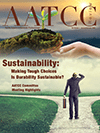
AATCC REVIEW
Innovating textile solutions for contemporary challenges.AATCC REVIEW is a distinguished journal published by the American Association of Textile Chemists and Colorists (AATCC), focusing on the interdisciplinary fields of textile chemistry, material sciences, and engineering. With an ISSN of 1532-8813, this journal serves as a vital platform for researchers and professionals engaged in the latest advancements and innovative practices within the textile industry. Despite its Q4 rankings in the 2023 category quartiles for Chemical Engineering, Chemistry, and Materials Science, AATCC REVIEW remains committed to enhancing its academic contributions and bolstering knowledge-sharing within its community. The journal, which has transitioned to a view title change in open access, enables a wider dissemination of research findings, thus supporting the global textile community in addressing contemporary challenges. With a coverage period from 2001 to 2020 and its U.S. base situated in Research Triangle Park, North Carolina, the journal plays a significant role in bridging the gap between academia and industry, making it an essential resource for students, researchers, and industry professionals alike.